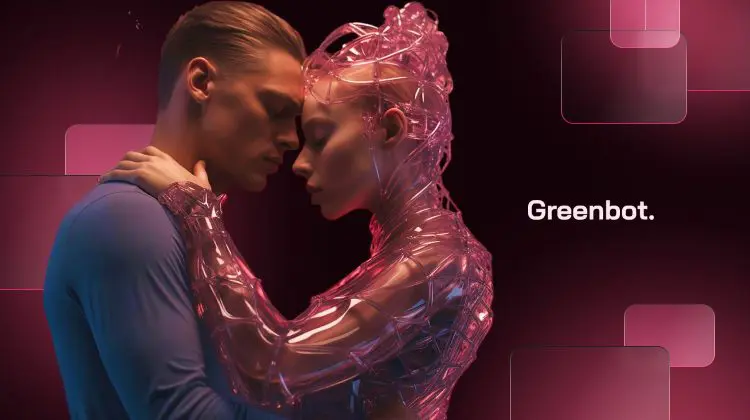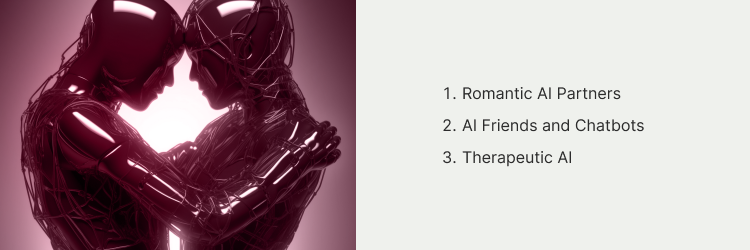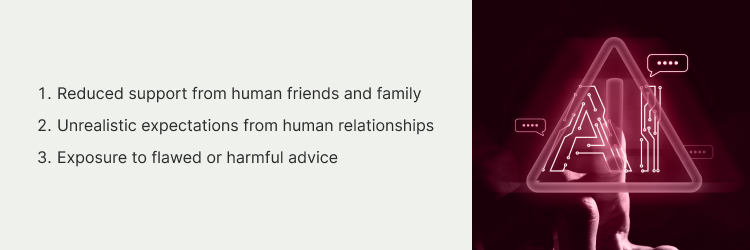
AI relationships are emotional and social connections people form with artificial intelligence systems. These connections can be romantic, platonic, or therapeutic. AI partners, companions, and friends are changing how we experience connection today.
AI relationships are becoming more popular, especially among Gen Z and Millennials. Around 25% of young adults believe AI partners could replace real-life relationships. These digital bonds offer comfort, companionship, and support.
While AI companions provide emotional benefits, they question their role in real human connection. These relationships are reshaping how we interact with technology and each other.
What Types of AI Relationships Exist?

People connect with AI in different ways, based on their emotional needs. The most common types of AI relationships fall into three main categories:
- Romantic AI Partners
Many form emotional bonds with an AI girlfriend or AI boyfriend. Platforms like Infatuated.AI offer daily chats, affection, and roleplay. Users can explore AI romance in a safe space. This form of AI companionship allows users to experience romantic relationships without the complexities of real-life dating.
- AI Friends and Chatbots
Some people engage with AI companions as supportive friends. These chatbots offer casual conversations and emotional support, without any romantic intent. They help users unwind, feel heard, or ease loneliness. These AI friends provide a simple way to enjoy companionship without the pressures of real-world relationships.
- Therapeutic AI
Platforms like Replika provide mental health support through calming conversations and reflective spaces. While not real therapists, these AI systems help users regulate emotions and feel understood. Many turn to therapeutic AI when opening up to others feels difficult.
Why Are People Turning to AI Companions?
When life feels overwhelming, many users turn to digital alternatives that are more accessible and less judgmental. For some, an AI friend offers emotional support that’s always available and never critical. In fact, 63.3% of student users reported feeling less lonely after regularly chatting with an AI companion.
Around 1% of users already have an AI friend, and another 10% are open to it. Most are young adults facing stress, social anxiety, or isolation. Research shows that low-income users and frequent porn consumers are more likely to embrace AI companionship. These conversations often feel safer than face-to-face talks.
People enjoy how AI companions respond to their moods and remember personal preferences. They often reply with comforting or playful messages that feel engaging and personal. This mix of companionship and control is emotionally rewarding and fun for many.
Who’s Most Interested in AI Relationships?
AI relationships attract those who grew up online. Gen Z and Millennials are leading this digital connection shift. They use AI companions not only for romance but also for comfort, curiosity, and emotional ease.
Here are key insights into who is using these platforms:
- 7% of unpartnered young adults are open to AI romance, including dating an AI boyfriend or AI girlfriend.
- 40% of Gen Z singles are comfortable with a partner having an AI companion.
- Those who spend 6+ hours online daily are likelier to form AI friendships than those offline.
- 15.43% of Gen Z fear their real-life partner might prefer AI, compared to 7.33% of Millennials—nearly double.
- Among young men, interest in romantic relationships with AI is higher, driven by loneliness or convenience.
- Young women are more cautious, focusing on trust and emotional safety when forming AI bonds.
Across both groups, interest in AI and human relationships continues to rise as digital norms evolve.
Emotional Benefits of AI Companions
AI companions offer emotional support and can positively impact mental health. Many users report feeling better after interacting with their AI friend. Here are some emotional benefits:
- Reduced loneliness: 90% of Replika student users felt less lonely after chatting regularly with their AI companion. For many, these digital connections provide much-needed companionship.
- A sense of being heard: People often feel understood when talking to an AI companion. These bots offer a safe space to express feelings without judgment or interruption.
- Lower anxiety levels: AI companions can help calm users by offering comforting responses. Many users feel less stressed and more relaxed after conversations with their AI friends.
AI companions can ease the emotional burdens many people face in their daily lives by offering a nonjudgmental ear. They provide a reliable and constant source of support, making users feel less alone.
The Risks of Becoming Too Attached to AI

While AI companions offer emotional support, there are real-world risks to becoming too attached. These risks can affect mental health and relationships.
- Reduced support from human friends and family: Spending too much time with an AI friend can lead to social isolation. Users may start withdrawing from human connections, reducing the emotional support they get from real people.
- Unrealistic expectations from human relationships: AI companions are always agreeable. They offer praise and comfort without conflict. This can create unrealistic expectations in real relationships, where disagreements and compromise are natural parts of life.
- Exposure to flawed or harmful advice: AI companions are not perfect. They may give advice based on limited data or repeat the user’s own beliefs, reinforcing biases. This can lead to harmful thinking or decisions.
Relying too much on AI friends can create emotional dependency. For a healthy life, it’s important to maintain a balance between digital and human connections.
Are AI Relationships Changing Human Connection?
AI relationships can change how people view and interact with human relationships as they grow. Here’s how:
- Constant availability: Unlike human partners, AI companions are always there when needed. This can create a sense of dependency, making real-life interactions seem less convenient.
- Idealized communication: AI partners always respond calmly and agreeably. This makes communication easy and smooth, but real relationships require more effort. Users may start expecting the same perfection from human interactions, which can lead to disappointment.
- Decline in ability to handle conflict: There is no conflict with AI companions. They are designed to be agreeable, which means users may struggle with disagreements in real relationships. Over time, people may find it harder to navigate human emotions and issues.
The more someone relies on AI relationships, the harder it may be to handle real-life relationships. Human-to-human interactions are complex, which AI companions can’t replicate. This shift in expectations could change how people approach love, friendships, and conflict in the future.
Ethics and AI Relationships
As AI relationships become more common, there are important ethical concerns to think about. Here are the key issues:
- Privacy and data safety: AI companions store personal information, like preferences and emotions. If not properly protected, this data can be misused or exposed.
- Bias in conversation and response generation: AI companions can repeat what users say, reinforcing existing beliefs. This can create echo chambers, where the AI only supports the user’s views.
- Manipulation and emotional dependency: AI companions are designed to be agreeable. This could lead to emotional dependency, making users rely on them more than real people.
As AI technologies become more realistic, we must consider how they affect privacy, mental health, and our views. Questions about accountability arise when AI companions give flawed advice or manipulate users.
Related: What is AI Ethics? Principles and Why It Matters
Will AI Relationships Replace Real-Life Romance?
Some people believe AI relationships could replace real-life romance. Here are the pros and cons:
Pros:
- Empathetic: AI companions offer emotional support that feels personal and real.
- Customizable: You can adjust your AI partner to fit your preferences, creating the ideal connection.
- Always available: You can talk to your AI partner anytime, making it easy to find comfort when you need it most.
Cons:
- No physical presence: AI companions don’t have a body, so they can’t offer the same physical connection a real partner can.
- Lack of spontaneity: AI relationships follow patterns. There’s no surprise, adventure, or unpredictability, which are natural in human relationships.
- Shallow advice: AI companions might offer advice, but it’s often based on data, not real-world experience. It can be one-sided and lacking depth.
25% of young adults think AI could replace real relationships. But 55% see it as a threat, while 45% find it exciting. As technology keeps evolving, it’s clear that AI romance is something people are both curious and cautious about.
Infatuated, Candy.AI, and GirlfriendGPT: What Do These Platforms Offer?
Digital relationship tools are growing more refined, offering unique ways to connect. Here’s how three of the most talked-about AI companion platforms are standing out:
-
Infatuated.AI – Best AI Relationships Overall (Best Choice)
This platform helps users form deep emotional connections with AI companions. Users can chat, role-play, and explore romance safely and privately. It supports text, image, and NSFW interactions, while also giving you control over relationship dynamics.
The Good:
- Emotional memory lets the AI grow with your relationship
- Prebuilt characters with evolving personalities
- NSFW content available with detailed boundaries
The Bad:
- Some advanced features require tokens
-
Candy.AI – Best for Voice Conversations and Role Play
Candy.AI gives you an immersive experience with voice-based chats and role-playing if you enjoy interactive, real-time communication. You can customize your AI’s personality and dive into fantasy roleplays or simple daily convos. The platform also supports adult content for users looking to explore that side of AI intimacy.
The Good:
- Realistic voice chat and voice replies
- Roleplay scenarios with mood and context flexibility
- Easy-to-use mobile interface
The Bad:
- Voice replies sometimes lack emotional variation
- Credits run out quickly during voice sessions
-
GirlfriendGPT – Best for Emotional Bonding and Realistic Personalities
GirlfriendGPT is all about building emotional closeness. It remembers past conversations and adjusts its tone to match your mood, making it feel like a real, steady companion. It’s ideal for people craving consistency and care in digital companionship.
The Good:
- Emotional tracking that adjusts tone over time
- Long-term memory creates a more realistic bond
- Simple interface with focused conversation UX
The Bad:
- Some emotional features are behind a paywall
- No voice or video chat features yet
FAQs About AI Relationships
Can you fall in love with an AI?
Yes, many people develop emotional attachments to their AI partners. The connection can feel real, especially when the AI adapts to your mood and preferences. The connection grows over time and can seem just as meaningful as a human relationship.
But it’s important to remember, AI companions are not human. They don’t experience emotions the way people do. These AI relationships are based on programmed responses, which can lead to unrealistic expectations about real relationships.
What’s the difference between an AI friend and an AI romantic partner?
An AI friend provides casual chats and emotional support without romantic intent. These AI companions are there to help you feel heard and to ease loneliness. They offer a safe space to talk without pressure or expectations.
An AI romantic partner, however, is designed for deeper emotional connections. It includes flirtation, intimacy, and even roleplay. AI romantic relationships mimic real-life romance but are limited to interactions programmed into the system.
Can AI relationships be harmful?
Yes, AI relationships can be harmful if you become too attached. Over-reliance on AI companions may reduce your real-world social interactions. This can lead to emotional dependency and loneliness when the AI isn’t available.
Another risk is forming unrealistic expectations. AI companions are always agreeable and non-confrontational, which could make real-life relationships feel difficult, especially when conflicts arise or people don’t act like the AI does.
Are AI companions safe to use?
AI companions can be safe to use if you follow privacy guidelines. However, sharing too much personal information can be risky. Use these AI companions on trusted platforms with strong privacy protection.
It’s also important to maintain a balance. AI relationships should not replace real human connections. Relying too much on AI chatbots may cause emotional issues and impact your ability to connect with people in real life.


























